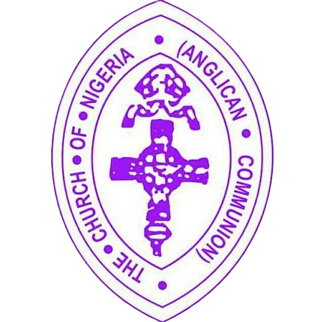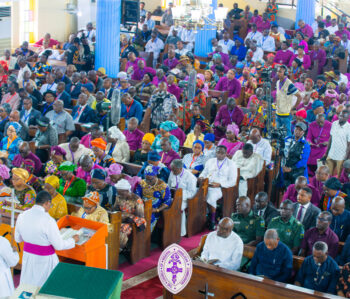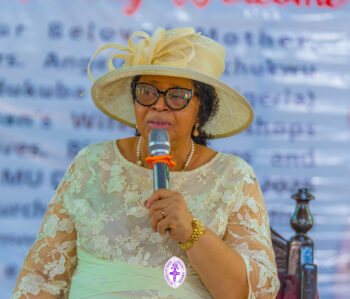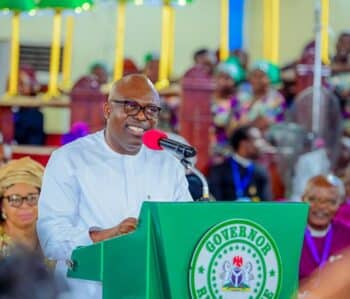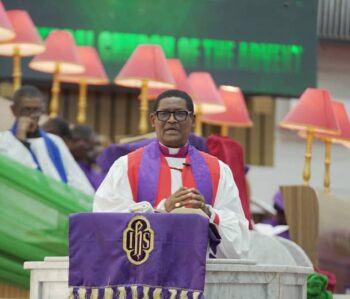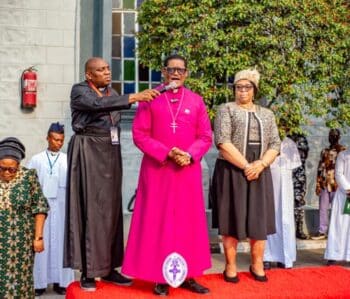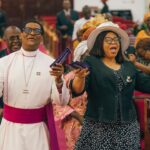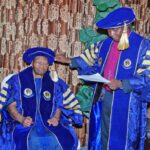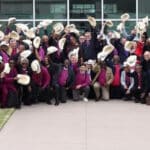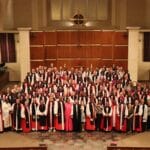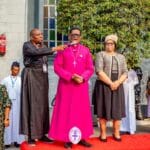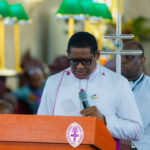- Korede Akintunde
- September 4, 2024
- 0 Comments
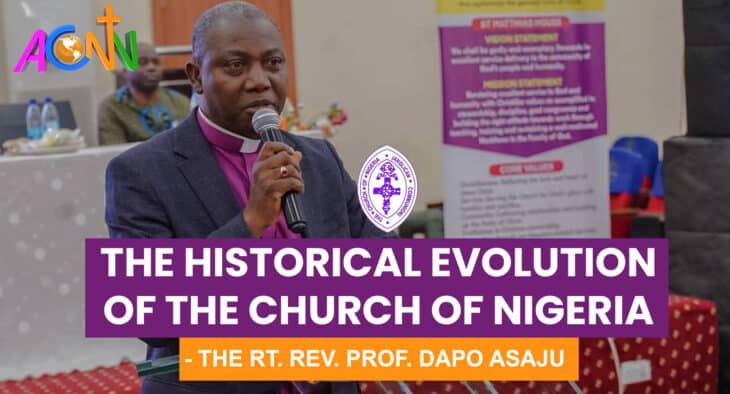
The Historical Evolution of the Anglican Church of Nigeria: An Outline By The Rt. Rev. Prof. Dapo Asaju was a lecture delivered on the 28th of July, 2024 at the Dinner organized for the Province of Rwanda by the Church of Nigeria, Anglican Communion as part of the special retreat of the Rwanda Bishops and their wives hosted in Abuja, Nigeria.
Rt. Rev. Prof. Dapo Asaju, is a distinguished Professor, Bishop Theologian and Diocesan Bishop of Ilesa in the Church of Nigeria.
Protocols:
The Primate of All Nigeria,
His Grace, Most Rev, Dr. Henry Ndukuba,
President of Girls and Women Organisations,
Con. Mama Nigeria, Mrs. Angela Ndukuba,
The Primate of Rwanda and Chairman of GAFCON,
Most Rev. Laurent Mbanda,
The wife of the Primate of Rwanda,
Mrs. Champtal Mbanda,
Archbishops,
Bishops’ Wives,
General Secretary of Church of Nigeria, Ven. Dr. Paul Dajur,
Registrar of the Church of Nigeria, Barr. Mrs. Kehinde Ajoni
All Clergy
Officials of the Churches of Nigeria and Rwanda,
Ladies and Gentlemen.
Backgrounds:
- African people, their tribes, cultures, religious and polity.
We had empires and ancient civilizations, e.g. Mali, Oyo, Asante, etc.
Egypt was cradle of civilization. Egypt enslaved Hebrews showing their past prominence as a powerful State. - The Slave Trade and the emergence of Racism against Africa- “The Hamitic” Theory and Biblical teachings were manipulated to fuel racism against the Africans.
- The Church of England actively involved in slave trade.
The Era of colonisation: Governance, Civilisation, Economic exploitation - The Anglican churches rode upon the wings of colonial governments, hence became the State Churches in African countries.
Rwanda is peculiar, having influences both from Anglophone and Francophone influences. - The Berlin Conference and the Partitioning of Africa ushered in colonialism which affected the identity of the church.Similarities between Nigeria and Rwanda:
- Both were colonies and had Anglican Missionaries
- Both had strong tribes who competed in political and social space
- Both experienced wars based on tribal conflicts (Nigeria-Biafra war and the Rwandan Genocide),
- Both had experiences of Pentecostal revivals which strengthened their biblical and Anglican orthodoxy and consequently a strong resilience and numerical growth . Consequently this has enriched the vibrancy of our Anglican worship.
(Nigerians Anglican Church produced the leading Pentecostal Church leaders in Nigeria such as Joseph Ayo Babalola, Benson Idahosa, Enoch Adeboye, William Kumuyi, Wale Oke, etc; similar to the Rwandan experience of the East African Revivals). - Both have strong Christian convictions and have as a result risen to the challenges of leadership of African reformation in GAFCONThe origins of the Anglican Mission and Church in Nigeria
—————————————————————————
The resolve of the Britain and other colonizers to find economic alternatives to the abolished slave trade, informed the organisation of explorations into parts of Africa, ultimately to exploit the people’s natural resources.Africa is still in the throes of slavery. After the initial forced capture and trans-Atlantic transportation of Africans to work on European plantations, the second phase emerged during colonisation, whereby the same Whites ruled over African peoples, forcing them to adopt their respective languages as lingua franca and adopting western style civilization. Today, African brothers are divided along Anglophone and francophone lines.
Colonies cannot freely communicate. France still exacts colonial tax from their former colonies. The recent military take- over of governments of Mali, Burkina Faso and Niger, are indicative that Africa is still not free. The third era of slavery is the current brain drain and mass exodus, by emigration, of African youths, to seek greener pastures overseas. African countries now train their younger plantations for the international market. This is slavery.
CMS: The Mission Agency
The Church Mission Society (also called Church Missionary Society (CMS), founded on 12th April 1799, was an offshoot of the London Missionary Society, started by the Clapham sect of young Christians educated at Oxford and Cambridge Universities, who had a passion for evangelising the dark continents of the world.
William Wilberforce, a member of this society would later lead the fight for the abolition of slave trade, by Act of Parliament in 1804.
The original idea of foreign missionary endeavour came from Charles Grant and George Udny, of the East India Company, and David Brown, of Calcutta. They sent a proposal to both William Wilberforce, a young British Parliamentarian and to Charles Simeon, a young clergyman at Cambridge University, in 1787. They then formed on the 12th April 1799, the ‘Society for Missions to Africa and the East’. This happened at a meeting of the Eclectic society, supported by the Clapham Sect (a group of young and fervent Anglicans led by Rev. John Venn, father of Rev. Henry Venn, later, the Secretary of the CMS Mission Office).
Although parts of Nigeria’s Niger Delta and Midwest had come into contact with Roman Catholic form of Christianity as early as the 16th century, it was not a formal evangelistic mission.
The CMS recruited missionaries, volunteers from diverse nations, who had a call to serve the Master Jesus in foreign pagan lands. Clergymen of German origin much as: Rev. C. A Gollmer, served on the mission.
It should be noted that CMS was a private initiative; hence, the established Church of England did not take the initiative or direct responsibility for African evangelisation. The church was involved as authenticating body for recognition and ordination or consecration of clergy that served on the mission.
The CMS was purveyor of the brand of Anglicanism, popularly described as Evangelicals, or Low Church. They differ somewhat from the other major mission agency, called the Society for the Propagation of the Gospel (SPG) otherwise known as United Society for the Propagation of the Gospel (USPG). This society adopted the Anglo-Catholic or High Church model of Anglican liturgy.
Both were protestant missionary movements, which employed proclamation of the gospel, church plants, education, medical care and social welfare as means of spreading Christianity.
The CMS tentacles extended to the following places or mission fields: West Africa (Guinea,1804; Sierra Leone, 1816; West Indies, 1813; New Zealand, 1814; India, 1814; Middle East, 1815; Sri Lanka, 1817; North West America (Canada), 1822; Egypt, 1825; Ethiopia, 1825; Egypt, 1825; Australia, 1825; South Africa, 1837; China, 1844; Palestine, 1851; Mauritius, 1854; British Columbia, 1857; Madagascar, 1863; , Japan, 1868; Iran ( Persia), 1869; Iraq, 1883; Sudan, 1899; East Africa, 1844 ( got to Mt. Kilimanjaro 1848, Kenya, 1849, Uganda, 1877; Tanzania, 1864;
The Anglican Church later came to Ruanda- Urundi between 1916 and 1919. The Ruanda Mission stations started as medical missions by Drs Algernon Stanley Smith and Leornard Sharp. It started as independent mission but later reincorporated into the CMS. Rwanda Mission emerged in 1919 while Burundi mission emerged in 1934.
Anglican Church in Nigeria
———————————–
The Church of Nigeria is perhaps the largest Anglican Church in the world today, in terms of active worshipping and practicing Anglicans. It claims an estimated population of over 18 million members (this figure is disputed- A study by Cambridge University Press opines that it is between 4.94 and 11.74 active members). It used to be regarded as the second largest province in the Anglican Communion, second to Church of England, but this has been reversed today, by the apparent revisionist trends of the Church of England, which has resulted into huge loss of population of practicing Anglicans.
Church of Nigeria currently has fourteen internal provinces. Church of Nigeria is undoubtedly the largest Anglican province on the continent of Africa, accounting for 41.7% of Anglicans in sub-Saharan Africa. The Province is currently led by its Primate, Archbishop and Metropolitan Most Rev. Dr. Henry Chukwudum Ndukuba, DD. and has 161 dioceses. It also has foreign missions to North America, Canada (Church of Nigeria North American Mission) and some francophone African countries.
CON has non -diocesan bishoprics such as Bishop Theologian (who supervises theological education and the seminaries, and the Bishop for the Normadic Mission.
The church has a counterpart of the CMS, in the indigenous Church of Nigeria Missionary Society (CNMS).
Most Rev. Henry Ndukuba, stated as follows, in his Foreword to the book- 180 years of the Anglican Church in Nigeria (1842-2022):
” Our heritage is the evangelical, orthodox Christianity and missions, as a church planted by CMS mission, define the church but the general inert to mission in the Church of England led to the emergence of missionary societies that are somewhat independent of the church, such as the status of the CMS that planted the Anglican church in Nigeria.”
The first exploratory mission into Nigeria area happened in 1841, in an expedition, which had on board, the Rev. James F. Schon and Samuel Ajayi Crowther. The mission was short-lived because of the fatalities suffered by many of the Whites as a result of Malaria. Even at that, Samuel Crowther introduced Christianity to the traditional ruler around Lokoja community and gave to him a copy of the Bible in Arabic. This setback of loss of European missionaries contributed to the ideology of Rev. Henry Venn, then Secretary of the CMS, who advocated for a native pastorate where the church is to be self- governing, self- propagating and self-financing. That was the bedrock of emergent African provinces of the Anglican Church.
The formal Anglican missionary endeavour to Nigeria began in December 17, 1842, with the arrival in Badagry, western Nigeria, of the British missionary, Rev. Henry Townsend, accompanied by Samuel Ajayi Crowther. They were preceded to Badagry by Rev. Birch Freeman of the Wesley’s (Methodist), who arrived in September. Both Townsend and Freeman celebrated the first Christmas in Nigeria in December 1842.
Samuel Crowther and Townsend pioneered the Yoruba Mission, but went on later to pioneer the Niger Mission. Crowther returned to England in 1843, was ordained and returned to the Yoruba mission, which by 1843 had moved its base to Abeokuta.
With the consecration of Samuel Ajayi Crowther on St. Peter’s Day, 29th June 1864 at Canterbury Cathedral, he was appointed by the license of the Queen Victoria, as Bishop of ‘Western Equatorial Africa in territories beyond the King’s Dominion’. He was the first ever Black Bishop of African descent. His jurisdiction covered what are now Nigeria, Sierra Leone and other parts of West Africa, like Gambia.
According to same foreword written by Primate Ndukuba,
” On January 10, 1852, the Lagos mission kicked- off. The CMS Igboland Missions began at Onitsha in 1857 covering the whole of Southeast, South and Lokoja area. In early 19th century, the CMS Northern Mission began as part of the Niger Mission in Lokoja, Ilorin, Gombe, Idah, Rabba ( and Nupeland)…. Bishop Frank Melvin Jones was consecrated on the Feast of St. Luke, in October 10, 1919, for the Diocese of Lagos which included the Northern Area (1919-1940)….The Diocese on the Niger was created on March 5, 1920, with Retired Bishop Herbert Tugwell acting as Bishop before Betram Lasbrey (1922-1945) was consecrated in 1922. The now many dioceses in the Church of Nigeria were offshoots from the above major pioneer dioceses of the Anglican Church in Nigeria.
The Anglican church of Nigeria remained a part of the Western Equatorial Africa, administered from Sierra Leone, under Most Rev. S.M.O. Scott, until on St Mathew’s Day, 24th February 1979, when the then fourteen dioceses in Nigeria were constituted into an autonomous Province of the Church of Nigeria.
The Province of Nigeria’s pioneer Archbishop (Primate), was Most Rev. Timothy Olufosoye, DD. He was then Bishop of the Diocese of Ibadan. He administrated the new province from his base at Ibadan. He focused on building the foundations of the province and encouraged youth and lay ministries in the church as a means to check the youth desertion of the Anglican Church in Nigeria.
A major doctrinal crisis started under Most Rev. Timothy Olufosoye, over women ordination, when Rt. Rev. Herbert Haruna of Diocese of Kwara actually ordained some women into priesthood ministry to the chagrin and objection of all other dioceses. He, like many liberal Anglicans may have been influenced by the practice of women priesthood by our sister East African Anglican Provinces; so, they wandered, why not in Nigeria, moreover, with the pervading euphoria of women liberation being canvassed especially by Feminists. The national Church could not immediately restrain Bishop Haruna because of the constitutional autonomy of each diocese, each guided by distinct constitutions and synods. However, later, the national Church exercised its superior powers by nullifying and defrocking the ordained women priests in Kwara Diocese.
The second Primate, Most Rev. Joseph Adetiloye, DD administered the Province of Nigeria, from his base as Bishop of the Diocese of Lagos. He was a radical watchman over Nigerian society, speaking truth to the military dictatorship of his time.
Adetiloye was a sound theological educator, Oxford University trained, a missionary par excellence, who, motivated by the Lambeth Conference’s declaration of a decade of evangelism, spearheaded the novel creation of nine missionary dioceses to the Northern parts of Nigeria which hitherto was dominated by Muslims who were hostile to Christianity .
It is noteworthy that Islamic dominance in the North and the intolerance of Christian evangelization in Northern parts of Nigeria were partly and fundamentally a consequence of British policy of Divide and Rule. Despite Anglicanism being of Church of England, the priority of colonial authorities was far from being interested in neither evangelism nor spirituality, but in diplomacy. They lived true to the popular saying that in diplomacy, there is no permanent friend, but permanent interest. Lord Frederick Lugard, then the Governor General of Nigeria, entered into and signed a covenant between British colonial office and Muslim Emirs, and afterwards issued an Edict, forbidding Christian evangelisation in Mohammedan Emirs. In fact, when Bishop Herbet Tugwell attempted a missionary entry into Zaria and Kano, he was thrown out! Hence, Christian missionaries settled at Wusasa on the outskirt of Zaria to commence their Christian labours of church plants, schooling and medical outreach. The story of Islamic fundamentalism, terrorism and banditry has risen to make Christians victims of Islamisation. This Christian- Muslim tension is found in most places where both religious co-exist and have large population of adherents. It appears that in some cases, the colonial powers, while exiting African colonies, deliberately handed power and privileges to tribes and religions which they favoured, against their consideration of merit or their Christian affiliation.
Archbishop Joseph Abiodun Adetiloye changed the story when he led the Church of Nigeria to approve the election, consecration and location of some young, dynamic, evangelical clergymen as missionary bishops to open up strategic towns and cities in the Northern Nigeria. He also hosts some wealthy dioceses and parishes to sponsor the nurturing of each missionary diocese for a given number of years until they were stabilised, to an extent. These young lads ventured into the unknown and developed the Anglican Churches which have grown to become dioceses at Bauchi, Yola, Maiduguri, Sokoto, Gombe, etc. Who would ever imagine then, that one of the missionary bishops, based at remote Gombe will like David the shepherd who was chosen to be king rise, rise to become the fifth Primate, Metropolitan and Archbishop of the Church of Nigeria, today, in the person of our current leader, His Grace, Primate Henry Ndukuba. How unfathomable are the ways and works of God!
Primate Adetiloye led the Nigerian Bishops to Lambeth Conference of 1998, where notable Nigerian Bishops, Most Rev, Adetiloye, Rt, Rev. Peter Akinola, Rt. Rev. Peter Adebiyi and Rt, Rev. Emmanuel Chukwuma contributed strongly towards the passing of resolution 1.10, which is still the centre stage resolution challenging revisionism of the Bible, Anglican orthodoxy and jettisoned of Biblical position on human sexuality, marriage and family.
As the Church of Nigeria grew in leaps and bounds, under Joseph Adetiloye, dioceses of the province were constituted into the initial provinces. Province 1 (Lagos and the West),
Province 2 ( East) , Province 3 ( North). Each province was headed respectively by Most Rev. Joseph Adetiloye, Most Rev. Benjamin Nwankiti and Most Rev. Peter Jasper Akinola.
The Most Rev. Peter Jasper Akinola succeeded Primate Adetioye and consolidated as well as enlarged the missionary innovations of Adetiloye. He created many more dioceses in all parts of the province. He consecrated more than 100 bishops. He instilled order and strong discipline in the polity, turning the primacy into a strong patriarchy. This sense of powerful primacy subsists in Nigeria Anglican church, unlike what obtains in most other Anglican dioceses and provinces where the primacy power is so whittled down: being primus interperes, in line with Anglican system of autonomy of dioceses.
Peter Akinola was very innovative. He pioneered Anglican evangelisation of Abuja, Nigeria’s political capital city and went ahead to centralise the administration of Church of Nigeria permanently in the Nigerian capital city. No more would the seat of governance rotate along with the diocesan bases of the serving primates. He followed this with raising robust Endowment funds of one Billion Naira as investment, for the development of the province and for financial buoyancy. Primate Peter Akinola went on to become the Chairman of Christian Association of Nigeria. During his tenure, he strengthened ecumenism and forged leadership over all Christian Church denominations in Nigeria. It was under his watch that he built the National Ecumenical Church Centre in Abuja.
The most profound achievement of Primate Akinola was his innovative conceptualisation and actualisation of Global African Conference as a resistance movement to revisionism and same – sex official indulgence by American , European and other heretics. He led the Jerusalem GAFCON, 1998, which passed the Jerusalem Statement.
Primate Peter Akinola created the office of the Bishop Theologian, after he encountered same office of Cardinal Theologian in the Roman Catholic Church. The Bishop Theologian overseas the theological positions, doctrines and statements of the church, supervises curriculum, management and welfare of Theological seminaries as well as organising training of Bishops, bishop’s wives, clergy and select lay ministers.
Most Rev. Akinola led the setting up of Language school to teach all seminarians of the church, competence in languages other than their own, to enhance clergy ministry anywhere in the country. He also established the Crowther Graduate Theological Seminary, Abeokuta as a centre of theological excellence. He was passionate that a good seminary will produce a good priest who will run a good church that is sound in the gospel. On the other hand, a priest trained in Liberal theology will produce a bad priest who will kill the church. Therefore he invested in theological education.
Peter Akinola was the first to initiate a consultative forum of bishops, clergy, laity, women, youths and professional experts to rain storm and advise him in blueprint to guide the ten years of his primacy.
Peter Akinola started CANA (Convocation of Anglican Nigeria churches in America, which has metamorphosed into GAFCON founded ACNA (Anglican Churches in North America)., and later, CONNAM ( Church of Nigeria North American Mission). This mission recently dissolved the erstwhile two dioceses in America, supervised by the Church of Nigeria.
Under Akinola, the agitation for women ordination, which reared its head under Adetiloye was put to the vote by the Standing held at St Michaels Cathedral in Kaduna but it failed unanimously when put to vote. Only one diocese, Asaba diocese supported it.
Akinola was an Apologist, after the order of African Church fathers like Athanasius, Tertullian and St. August in. He provided leadership to GAFCON, CAPA and Global South. He authored a major book, ‘ Who Blinks First?’ which documented the full details of the ‘Homosexuality war’ in the Anglican Communion. He conferred on African Anglican churches, the leadership they historically earned and deserved, as in the early church.
Under his watch, Church of Nigeria modified its Constitution, wherein being Anglicans is not determined by a province, remaining in active communion with the Sea of Canterbury. Rather, it is redefined by a person who believes and subscribes to the authority of the Holy Bible, Book of Common Prayers, the Historic Creeds, the faithful Hymnals, the Chicago Quadrilateral and the GAFCON Jerusalem Statement. According to vintage Peter Akinola, “The road to heaven does not pass through Lambeth or Canterbury”.
The fourth Primate of the Church of Nigeria is Most Rev. Nicholas Okoh, LLD, DD. Commenced his primacy by visiting each of the provinces of Church of Nigeria, after which he also called for a consultation which produced a blueprint for his primacy. Results of that manifested in several novel ideas which he introduced, which focus more on spiritual development of the Anglican Church. Most Rev. Nicholas Okoh has to his credit the following achievements:
1. Establishment of Anglican Cable Network ( later changed to Advent Cable Network) through which Anglican Cable Network which is transmitted globally, 2. Introduction of daily devotional, named Daily Fountain, 3. Introduction of annual spiritual revival convention called DIVCCON,
4. Centralisation of entry examination (Church of Nigeria Jojbt Entrance Examinations (CONJEE, 400 questions set; 100 each on Bible Knowledge, Anglicanism, Use of English and General Studies). Only candidates who score minimum cut off marks are considered for admission into the various Theological seminaries of the Church of Nigeria.
5. He approved the annual conference of Chancellor and Registrars and Legal Officers of the Church of Nigeria which gave forum for discussing crucial matters bothering on the Constitution and legal issues of the Church.
The fifth Primate and the Incumbent began his primacy on an evangelistic note, as he declared his tenure as ‘The Reign of God’. This was a clear announcement that his priority is spiritual rejuvenation, moral revival and spiritual reformation of modern christianity.
Archbishop Henry Ndukuba also called a consultation to suggest pathways into his primacy.
In the same vein, he called Theological consultation which is geared towards revolutionising the quality , management and curriculum of theological education in Church of Nigeria.
A very passionate preacher, Most Rev. Henry Ndukuba’s antecedents prepared him for the direction he is towing. An exposed theologian of Princeton (USA) and Durham (UK) training, he has brought to bear his sound theological education, his pragmatic experiences on the Northern Nigeria mission field and his experiences serving as vanguard of the Church of Nigeria’s Spirituality and Liturgical Committee for Many years.
During the short period of his service as Primate, he has successfully maintained the various programmes put in place by his predecessor primates. In addition, he has introduced the following:
1. Established the Joshua Generation conference for reclaiming and retaining Anglican youths throughout the country. The conference which had an average attendance of between 25,000 to 30,000 Anglican youths, deepen their faith, strengthens their Anglican commitment, trains them in sports and entertainment careers; in other words, the Primate has pursued vigorously the maxim of taking the gospel to the market place. This is a potent method to check the mass exodus of Anglican Youths to the so- called Pentecostal or new generation churches.
2. Raising the bar of theological education to minimum Bachelors Degree in Theology as prerequisite to ordination in the Church of Nigeria, no longer will Diploma in Theology be a vegetable as sufficient for ordained clergymen. The Pew must not be higher intellectually than the Pulpit!
3. The Primate has also introduced a good number of other initiatives such as war against drug addiction and use, and organising conferences for professionals.
4, Primate Ndukuba inaugurated the School of Missions at Osoogun, hometown of Bishop Samuel Ajayi Crowther. Training of missionaries and evangelists are vigorously pursued.
Concluding Remarks:
The Church of Nigeria (Anglican Communion has come a long way, by way of growth and development over the 182 years of its existence. The church is cohesive, in spite of the tribal divides of the nationalities. The General Synods and Standing Committees provide regular opportunity for fellowship and interchange of ideas.
The theological education sector is forging unity among priests as they are exposed to serving in places other than a particular priest’s place of origin. Episcopal synods are well managed and respected. Ecumenical relationships and role of the church is maintained. At the moment, the current President of the Christian Council of Nigeria is the Anglican Archbishop David Onuoha of Owerri Diocese.
The experiment of ecumenical Church union, enacted in the 1960s has succeeded in part. For instance, Immanuel College of Theology, Ibadan is still being jointly run by the Anglican and Methodist churches. Same experiment did not subsist at Trinity College of Theology, Umuahia.
The Church of Nigeria has made impact on education sector. Three private universities in Nigeria are owned by the Anglican Church, with two more soon to commence.
Anglicans have provided leadership politically for Nigeria over the years. These included Heads of state, politicians and professionals in every field.
Dioceses have made their own giant strides. Many have introduced Church Knighthoods (addressed as Sirs and Ladies or Dames) to empower lay ministry support for the church. This is most popular in the Eastern churches. Churches in the West install church chiefs (addressed as Chiefs).
Some dioceses established colleges and Nursing schools.etc.
Lay ministries are developing, such as Youth Ministry, Children ministry, women ministry. Some dioceses establish Bible schools to train lay ministers.
The Church of Nigeria has recently mandated all aspiring postulants to have served for two years on the Church as Agents Catechists or Evangelists before they are eligible for seminary training.
In general, the Church of Nigeria is marching on as vanguard of Biblical orthodoxy and Anglican orthodoxy, not only in the country, but globally, as divine destiny has rightly positioned her.
Thank you for your attention.
Rt. Rev. Prof. Dapo Asaju,
Distinguished Professor,
Bishop Theologian and Diocesan Bishop of Ilesa,
Church of Nigeria.
